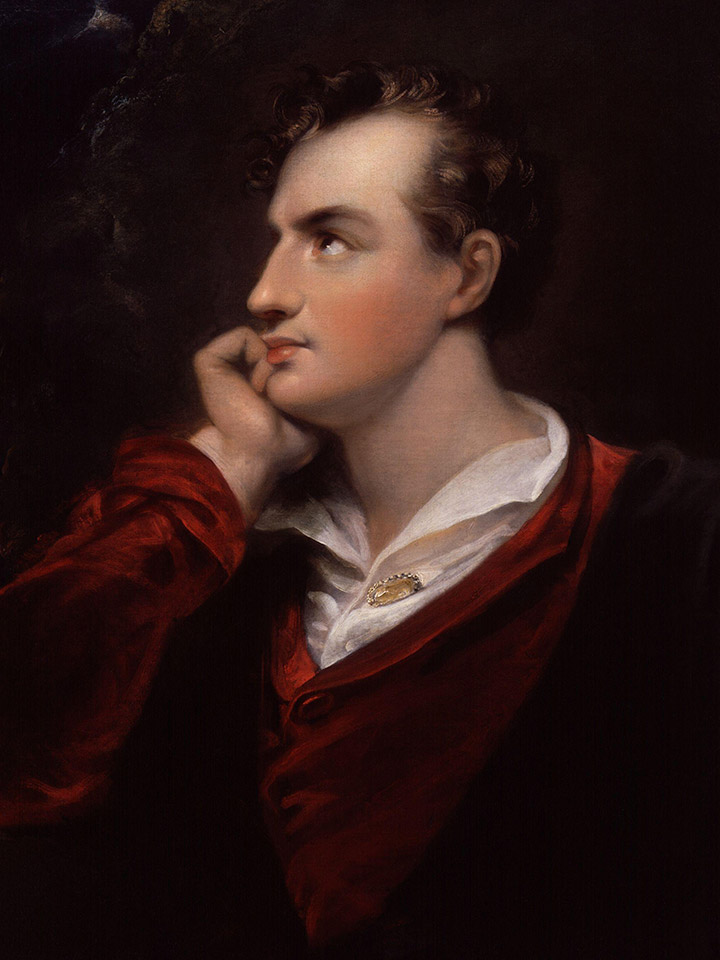Lord Byron
Birth Name: George Gordon Lord Byron
Nickname: Lord Byron
Born: January 22, 1788 in London, England
Died: April 19, 1824 in Missolonghi, Aetolia, Ottoman Empire
Time Period: Romantic
Expertise: Letter Writer, Poet, Politician
Known For: Don Juan, Hebrew Melodies

Quotes
Interesting quotes by Lord Byron
“Always laugh when you can, it is cheap medicine.”
“If I do not write to empty my mind, I go mad.”
“Love will find a way through paths where wolves fear to prey.”
“A drop of ink may make a million think.”
ADVERTISEMENT
Bio
A brief biography of Lord Byron
George Gordon Lord Byron was born on January 22, 1788 in London, England. He was an influential poet of the Romantic period, as well as a politician. Byron is best known for his works “Don Juan” and “Childe Harold’s Pilgrimage.”
Lord Byron was born to a Captain in the British Army and an heiress. Shortly after his birth, Byron’s father died in 1791 of tuberculosis. However, Byron believed his father cut his own throat and had made claims of such an event, even though there was and is no supporting evidence.
Some years later, one of Byron’s mother’s suitors, Lord Grey De Ruthyn, pursued young Byron and put sexual advance on him. However, he never discussed the matter with his mother and was internally filled with rage. Byron refused to speak to Ruthyn and ignored all of his mother’s demands regarding the man. The abuse Byron suffered would go on to affect him later on, procuring sexual liaisons with young men at his grammar school, Harrow, which continued when he attended Trinity College in Cambridge, and later during his travels throughout Europe. Byron was rather fond of a fifteen year old boy named, Loukas Chalandritsanos and left him £7,000 in his will.
Lord Byron’s “Don Juan” is regarded by many as his best poem—a lengthy narrative containing seventeen cantos—and is held as one of England’s most important extensive poems. At first, Byron anonymously published the first two cantos in 1819 because of disputes with his current publisher at the time, as its language was thought to be rather shocking. However, Byron was already established as an acclaimed poet for several years so when he self-published the cantos they received approval. Shortly after, the poem was published in volumes by his regular publisher. Unfortunately, by 1822 the approval had transformed into rejection, and Byron’s publisher denied to continue printing. In the third canto of “Don Juan”, Byron revealed his abhorrence for William Wordsworth and other writers. In a series of letters to Francis Hodgson, Chairman of Eton College, Byron would refer to Wordsworth as “Turdsworth”.
On February 15, 1824 Lord Byron fell ill. The method of bloodletting was employed, but only made matters worse. Byron managed to have a minor recovery, but was left rather weak from the “treatment.” The following April, he caught a severe cold and bloodletting was thought to be the solution again. The method of treatment was done with medical equipment that was not sterilized and Byron developed a septic infection as a result, which caused a dangerously-high fever.
Lord Byron died on April 19, 1824 in Missolonghi, Greece, being only 36 years old. He was buried in St. Mary Magdalene Churchyard in Nottinghamshire, England in a family vault after his burial was refused in Westminster Abbey. In 1969, Lord Byron was honored in the Poets’ Corner with a memorial floor stone.
Although he died young, Lord Byron left behind a legacy of great poetry and influence, and he as gone down as one of the greatest poets of Western Literature. He inspirited many other writers, such as the Brontë Sisters, and even composers, such as Beethoven, by placing his poetry to music. His works were transformed into over forty operas, along with three operas about the man himself.
ADVERTISEMENT
Works by Lord Byron

Download free Lord Byron books. Listen to Lord Byron audiobooks.

ADVERTISEMENT
External Links for Lord Byron
Lord Byron on Wikipedia
https://en.wikipedia.org/wiki/Lord_ByronLord Byron on Wikisource
https://en.wikisource.org/wiki/Author:George_Gordon_ByronADVERTISEMENT
Other Authors

See other authors of the Romantic period

